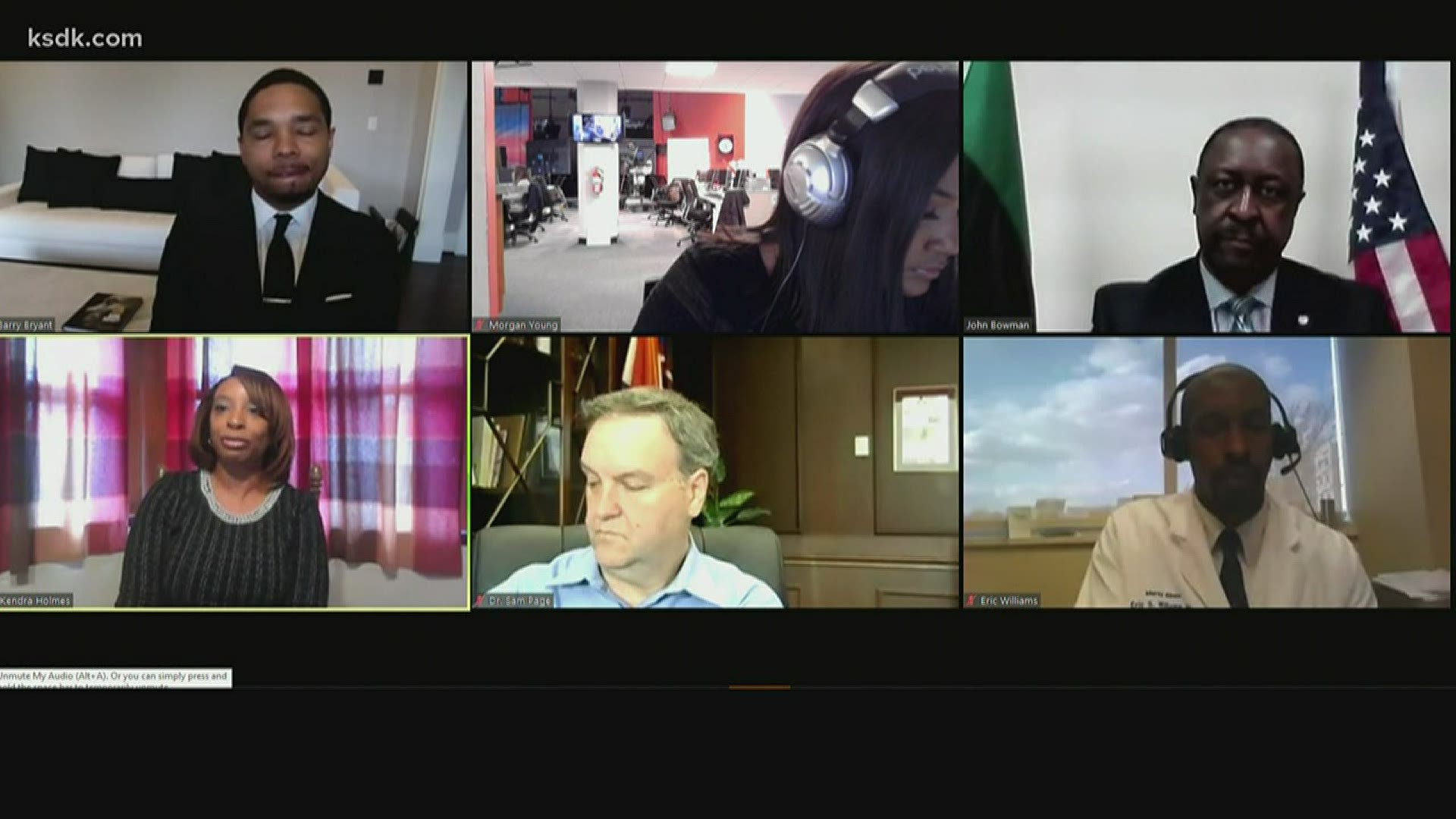ST. LOUIS COUNTY, Mo. — The St. Louis County chapter of the NAACP held a virtual town hall meeting Tuesday evening to address how COVID-19 is hitting the black community, particularly residents in north county.
The town hall was moderated by 5 On Your Side's Morgan Young and included panelists who are medical professionals and elected officials, including County Executive Dr. Sam Page.
The town hall can be found here as a Facebook Live link.
Issues discussed included accessibility and availability of testing, shortages of medical supplies, health and social factors that contribute to vulnerabilities in the black community and how the county plans to support.
“If we were putting testing sites where there was the greatest need, it should have been a no brainer that testing sites should have been in North City and North County from day one," Dr. Kendra Holmes, vice president and chief operating officer for Affinia Healthcare, said.
The first testing site in the county was located in west county, which Page said was not a decision made by county officials. However, he added that more resources have been added and shifted.
“We found that most of those tests have been delivered to North St. Louis County, and that’s why most of the positive tests are in those zip codes," Page said.
Page said he requested the St. Louis County Council to approve for $7 million to be moved from the county's health fund to go toward purchasing more testing as it's becoming more available. His office also announced proposed legislation to create a fund for the $175 million of federal relief the county is expecting to receive. The announcement stated the funds would specifically be focused on under-served communities, particularly black communities. It also said there will be a system in place for residents to be able to see how the funds, which must be used for COVID-19 relief, are being distributed.
Dr. Holmes said the climate between the black communities and the healthcare industry has "always" been one of distrust, and while there are steps being taken, she said there is still a long way to go.
“It’s absolutely wonderful those resources are now being dedicated to underserved populations," Dr. Holmes said. "It’s just very unfortunate that it took this for those resources to be available to be under-served populations.”
Page said the funding will be split into three focuses: the healthcare crisis, the humanitarian crisis and the economic crisis.
“We initially will focus on testing, access to treatment and care,” Dr. Page said. “We’re putting together a COVID at-home care package for people who may not have the resources to quarantine at home. We’re buying hotel rooms for people who don’t have a place to stay or can’t safely isolate or quarantine at home.“
He also said there are resources available for the homeless and others who are not able to practice social distancing.
“Anyone who tests positive and needs to be isolated who lives in close quarters, who doesn’t have the ability to have their own restroom, their own room and their own bathroom as part of that isolation strategy, we can put them up in a hotel," Page said.
Dr. Holmes said the response, while still having great potential to preserve lives, was "delayed". Page said the initial lack of response and current lack of resources started at the federal level.
“Our country was certainly late," Page said. "We’ve seen our inability to establish a national testing strategy. We are where we are because this wasn’t taken seriously back in January when the CDC and our public health officials at the national level sounded the alarm."
As the county continues its attack on COVID-19, Page said the virus has made many of the disparities, which he said he was well aware of, unavoidable from conversations and planning for the county.
“Racial segregation has a long history in our region, and that’s been going on for decades,” Dr. Page said. “There were individuals who did not recognize this other than myself and some other elected officials who did not recognize these disparities, what this pandemic has done is shine a spotlight on inequities. We recognized those inequities early on and directed those resources where they were needed.
He said the conversation will continue post-pandemic.
“We have to leverage resources, we have to talk about Medicaid expansion, we have to talk about things that not everyone in the state understands," Page said. "This epidemic has changed the conversation. It’s changed the way we talk about it. It’s a very tragic event. It’s given us the opportunity to refocus the conversation and bring people to this conversation that weren’t there in the past."

